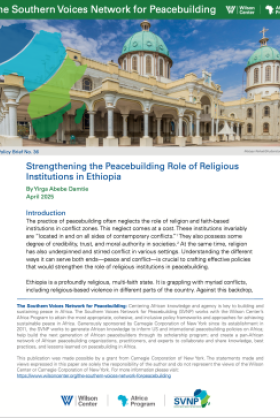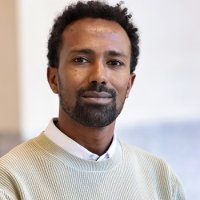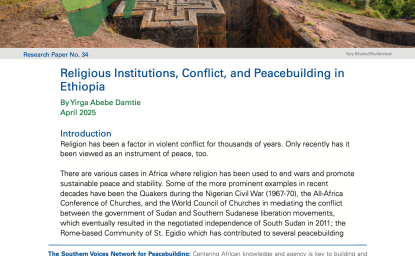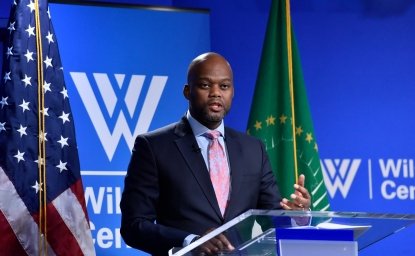Strengthening the Peacebuilding Role of Religious Institutions in Ethiopia



The practice of peacebuilding often neglects the role of religion and faith-based institutions in conflict zones. This neglect comes at a cost. These institutions invariably are "located in and on all sides of contemporary conflicts."1 They also possess some degree of credibility, trust, and moral authority in societies.2 At the same time, religion has also underpinned and stirred conflict in various settings. Understanding the different ways it can serve both ends—peace and conflict—is crucial to crafting effective policies that would strengthen the role of religious institutions in peacebuilding.
Ethiopia is a profoundly religious, multi-faith state. It is grappling with myriad conflicts, including religious-based violence in different parts of the country. Against this backdrop, religious institutions possess the necessary agency and resources to foster peace in the country.
Currently, Ethiopia is wracked by an ongoing armed conflict in the Amhara and Oromia regions, while in the Tigray region, a fragile peace is narrowly holding after a devastating two-year (November 2020-November 2022) war. There are also sporadic eruptions of violence, with varying causes and origins, across the country. Ethiopia is a highly strategic state in the wider region. Instability and insecurity within its borders can have consequences throughout the Horn of Africa.
Religious institutions have a profound impact on Ethiopian society. They have, however, complex linkages with conflict across the country, as has been evident in religious-based violence in various parts of the country, including Addis Ababa, Dire Dawa, Gondar, Motta, and Shashemene as well as Silt'e Zone.3 According to the Ethiopian Peace Observatory, there were a total of 43 violent events in Ethiopia involving religious actors in 2021 and 2022 and 13 in February 2023 alone.4 In specific contexts, religious-based violence is interconnected and sequential, where violence in one place has led to similar incidents elsewhere.5
Religious-based tensions arise from the complex interactions between religion and the state, as well as contestations among different religious groups and intra-religious disputes, such as the violence that followed the attempt to establish a separate "Holy Synod of Oromia, Nations and Nationalities" by breakaway bishops of the Ethiopian Orthodox Church in February 2023.
Religious actors have also been used for mobilization in political conflicts. One such case is the war in Northern Ethiopia, where religious actors played a key role in (de-)legitimizing the aims and actions of the conflicting parties. This has resulted in an emerging rift within the Ethiopian Orthodox Church between its leadership based in Addis Ababa and religious actors in the Tigray region.6
The role of religious institutions in conflict in Ethiopia goes beyond being a driver and mobilizer. In various parts of the country, there have been several attacks against religious institutions and members, which, in turn, served as a trigger for the outbreaks of religious-based violence in a country that has a long history of peaceful coexistence of faiths.
More often than not, however, religious entities in Ethiopia have played a vital role in reducing conflict and contributing to peacebuilding efforts. In low-intensity and localized conflicts, religious bodies frequently act as mediators. The peacebuilding role of religious institutions also extends to wartime. This author examined one recent case in detail: the Ethiopian Orthodox Church in Woldiya, Lalibela, and Sekota towns during the Tigray War (2020-2022) in Northern Ethiopia. In this context, the church played numerous roles, including humanitarian, mediating, financial, governance, and psychosocial, in an attempt to support communities impacted by the war.
In particular, the church was able to collect and distribute humanitarian assistance to impoverished sections of society, provide loans to local populations, and maintain certain public services during the war. The Ethiopian Orthodox Church was also able to offer psychosocial support to people traumatized by the war. Notably, it undertook its peacebuilding roles in areas that were largely inaccessible to other organizations that might otherwise have provided similar forms of assistance.
These practices demonstrate the potential for religious institutions to serve as peacebuilders in Ethiopia, complementing the work of secular structures. Yet their efforts have largely gone unnoticed by international and national actors: the National Dialogue Commission faced severe criticism from the Ethiopian Orthodox Church for its exclusion from the Commission's work.7
Given the demonstrable impact of religious institutions on peacebuilding, particularly amid armed conflicts where other actors are unable to play active roles safely and effectively, this policy brief offers the following recommendations for strengthening peacebuilding in Ethiopia.
To the Ethiopian Government:
To the Inter-Religious Council of Ethiopia (IRCE) and Civil Society Organizations (CSOs):
To the United States and other international actors:
[1]: Lederach, J. P. (1993). Pacifism in Contemporary Conflict: A Christian Perspective. In United States Institute of Peace symposium on Religious Perspectives on Pacifism, Washington DC. Vol. 28.
[2]: Sampson, C. (2007). Religion and peacebuilding. In Zartman, W.I. (ed.).Peacemaking in international conflict: Methods and techniques. Washington DC: United States Institute of Peace. 273-323.
[3]: Inter-Religious Council of Ethiopia. (2022). The Role of Inter-Religious Council of Ethiopia in Peace-Building Process in Ethiopia: Opportunities and Challenges. A National Level Assessment Final Report. https://ircethiopia.et/wp-content/uploads/2024/01/FINAL-RESEARCH-REPORT.pdf
[4]: Ethiopia Peace Observatory. March 08, 2023. Religious Disputes and Government Involvement in Ethiopia: Monthly Report. https://epo.acleddata.com/2023/03/08/epo-february-2023-monthly-religious-disputes-and-government-involvement-in-ethiopia/
[5]: Ethiopia Observer. April 30, 2022. “A wave of religious violence sweeps following the attack in Gondar.” https://www.ethiopiaobserver.com/2022/04/30/a-wave-of-religious-violence-sweeps-following-the-attack-in-gondar/
[6]: Schipani, A. August 28, 2023. “ ‘God wants us away from our enemies’: bitter legacy of war splits Ethiopian church.” Financial Times. https://www.ft.com/content/e57c58c7-9ebb-4683-822b-4c35543ad11f
[7]: Addis Standard. June 6, 2024. “Holy Synod Criticizes National Dialogue Commission for exclusion, calls for Church’s ‘formal’ participation.” https://addisstandard.com/holy-synod-criticizes-national-dialogue-commission-for-exclusion-calls-for-churchs-formal-participation/?amp=1


The Africa Program works to address the most critical issues facing Africa and US-Africa relations, build mutually beneficial US-Africa relations, and enhance knowledge and understanding about Africa in the United States. The Program achieves its mission through in-depth research and analyses, public discussion, working groups, and briefings that bring together policymakers, practitioners, and subject matter experts to analyze and offer practical options for tackling key challenges in Africa and in US-Africa relations. Read more




